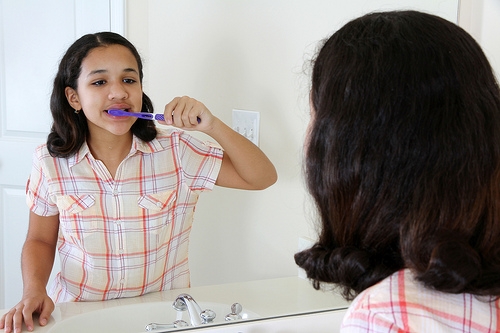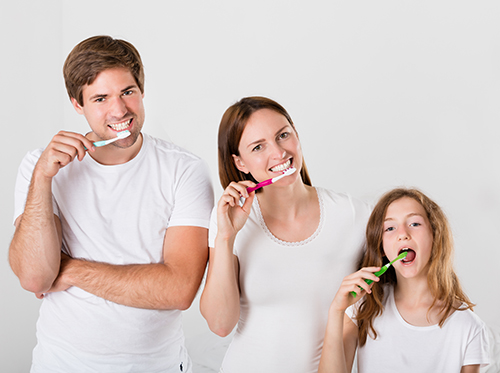June 26th, 2019

Your teeth were once naturally white and bright. Wouldn't it be great to keep them that way all of your life? Unfortunately, everyday living can dim our smiles. Food, coffee, some juices, and soft drinks can stain your teeth. Poor brushing and flossing can also leave tooth stains. Injuries to teeth or gums can cause some yellowing as well, and in some cases, medicines can discolor teeth.
So, you may need some extra help to maintain or restore your teeth's natural beauty. Here are some of the best ways to whiten your teeth:
1. Reduce additional staining by drinking with a straw or cutting back on coffee and soft drinks.
2. Brush and floss every day.
3. Try a whitening toothpaste or mouthwash.
4. Visit our office for teeth cleaning and an exam every six months.
We can also help you whiten your teeth with in-office professional teeth whitening at our Roseville, CA office. These whitening products are much more effective than whiteners you can buy at the store and are completely safe. Since they're stronger, application by a member of our team is essential to achieve the best results.
Some teeth can resist bleaching. If that's the case, we can try several techniques:
- Deep bleaching that applies whitening agents over several visits.
- Veneers and bonds that cover existing stains with a whiter, brighter surface.
- Laser whitening that uses light to clean stubborn stains off teeth.
Take Care!
You may come across “bleaching stations” in shopping malls or at fairs. Avoid using these as the so-called whitening techniques can irritate your teeth and gums, leaving them highly sensitive to pain. Note too, that the operators of these whitening stands will make customers apply the bleach themselves, to avoid charges of practicing without a license. That should serve as a red flag and a caution to seek trained professionals, like Drs. Sidney and Jacob Kelly, instead.
June 19th, 2019

Drs. Sidney and Jacob Kelly and our team at Sidney D. Kelly, DMD Family and Cosmetic Dentistry frequently get questions about cavity causes and prevention. You brush twice a day and floss regularly. You rinse with mouthwash, just like the dentist recommended. In fact, you can’t remember the last time you had a cavity, but you think it was when you were a little kid. In all seriousness, you thought only kids got cavities.
The Signs and Symptoms of a Cavity
It’s believed that roughly 90% of North Americans will get at least one cavity in their lifetime. Those other ten percent, it seems, can eat as much pie, cake, and sugary cereals and sweets as they want. That’s not really true; just a stab at dental humor, and it was as bad as the pain your cavity is probably giving you.
When a cavity is in its initial stages, you will often be symptom-free and experience no discomfort at all. It’s not until the tooth decay has reached a certain level that you will begin to notice the signs and symptoms. While a toothache and sensitivity to hot and cold foods and liquids are surefire signs that you have a cavity, there are lesser-known symptoms as well. If you’re experiencing any of these warning signs, you may want to consider making an appointment with our office as soon as possible:
- Persistent bad breath or a bad taste in the mouth
- When you bite down, there is a sticky, tarry feeling
- Puss or discharge around a tooth
- A visible discoloring, usually black or brown
- Small pits or holes in the tooth
Routine dental care is important. While good oral hygiene, a healthy diet, and regular cleanings will deter the formation of cavities, they do not constitute a foolproof practice. A cavity can occur at any time, no matter what your age. Bacteria causes tooth decay, and no amount of brushing, flossing, and rinsing will eradicate all the bacteria from your mouth. If you think you may have a cavity, please contact our office immediately.
June 12th, 2019

Nobody likes a dry mouth. It is an uncomfortable and sometimes oddly unexplainable sensation that most people like to avoid. It is not a condition that automatically sends you into a panic about your health, however, a dry mouth can be a bother and something you certainly want to change if possible. So, if you find yourself in the unpleasant position of having a dry mouth, here is what you can do.
Chew Sugar-free Gum: Chewing sugar-free gum will stimulate saliva in your mouth. The chewing motion of your jaw and teeth should take care of at least some of your dry mouth problem.
Suck on Sugar-free Candy: Similarly to chewing sugar free gum, if you suck on sugar free candy it should create more saliva in your mouth and moisturize it in the process.
Cut out the Caffeine:Caffeine can contribute to a dry mouth so by limiting, or eliminating your intake all together, you may find that your dry mouth is no more.
Stop Using Tobacco Products: Tobacco is another cause of dry mouth. Whether it is smokeless tobacco products or cigarettes, if you stop using them your dry mouth will likely improve. And not to forget, these products are exceedingly bad for your oral health to begin with, so you will be doing your mouth a favor even more so.
Drink Lots of Water: It may seem obvious, but drinking lots of water will likely improve your dry mouth. This is because dry mouth is usually a sign of dehydration, so plenty of fluids will surely help.
Dry mouth can be unpleasant, but it is often easily solved by either drinking more water, or trying one of the previously mentioned techniques. If the problem still persists you can always visit our Roseville, CA office to see Drs. Sidney and Jacob Kelly. More often than not, doing one of the above will leave your mouth more moisturized than it was previously, and hopefully it will be long-lasting as well.
June 5th, 2019

It’s gratifying to know your child has good oral hygiene, especially starting from an early age. We know it can be difficult to get your son or daughter to brush those tiny teeth, let alone brush them well enough, every day. Drs. Sidney and Jacob Kelly and our team are here to give you some tips on how to help your youngster learn excellent oral health habits.
Your child should brush his or her teeth at least twice a day in order to prevent cavities and decay. An grownup may have to assist with flossing or using mouthwash. Always make sure your little one doesn’t swallow toothpaste or mouthwash in the process.
Only buy alcohol-free mouthwash, especially if you have young children in your household. Oral healthcare should be made fun from the start, to create good habits!
Helpful Tips
- Set a good example. Brush your teeth with your children and make it fun! Pick a two-minute song to play while brushing and dance along to it.
- Make it a race to the bathroom to see who can get the toothbrush and floss out first.
- Use a sticker sheet. For every night your children brush well, give them a sticker. After they’ve earned certain number of stickers, they win a reward. Let them pick it!
- Let your child check your brushwork, or try letting your youngster brush your teeth!
- Allow children to play with a toothbrush if they want to. They can brush their favorite stuffed animal’s or doll’s teeth before bed as well.
- Let your child pick his or her own toothbrush or toothpaste from a range of options you provide. Kids might pick one with their favorite cartoon character(s) on it, for example.
- Get a two-minute brushing timer your child can flip over when he or she starts to brush. Your son or daughter can watch the sand fall until it’s empty, which notifies the kid it’s time to stop brushing.
- Buy special children’s mouthwash that is colored to stain the areas of the child’s mouth where he or she needs to re-brush for effectiveness.
- Be gentle when your little one makes a mistake like forgetting to brush, and remind your son or daughter about the importance of good oral health in a fun, loving way.
There are plenty of ways to make brushing your child’s teeth more fun and effective. When Drs. Sidney and Jacob Kelly and the parents work together, we can help establish good oral health habits in children that will last a lifetime.
Take the trouble to set a great example for your children, and they will follow in your footsteps. If you’re concerned about your child’s oral health, contact our Roseville, CA office and schedule an appointment with our team.




